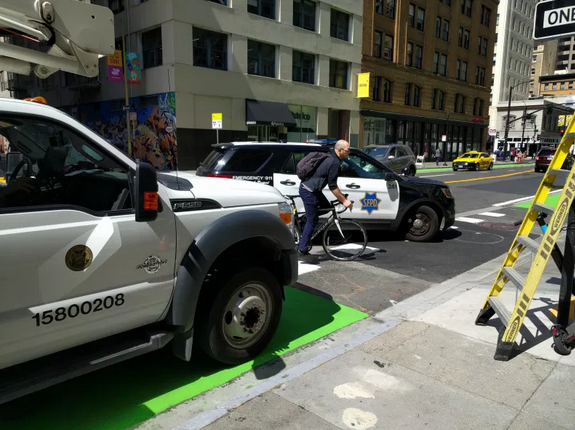“What you do speaks so loudly that I cannot hear what you say.” ~Ralph Waldo Emerson.
Board President Norman Yee and Supervisor Aaron Peskin introduced legislation on Monday "to strengthen reporting requirements on City vehicles to reduce budget waste and improve driver safety." The legislation is a response to recent telematics data that indicates there were 362,922 recorded speeding incidents over a 13 month period by city drivers of city vehicles. A little over 16 percent of incidents were between 20 to 28.9 miles over the speed limit.
It's unclear, however, why strengthened reporting is necessary. The report the supervisors are responding to indicates that the city already has all the data it needs to track down and discipline the scofflaw drivers among its 30,0000 employees, before they run someone else down.
From the August Budget and Legislative Analysts report on telematics data from the city's cars and trucks, page 46:
Note that since the data we received was anonymized there could have been different or multiple drivers per unique vehicle that accounted for the spending incidents. This would be especially true among shared and pool vehicles.
However, the report adds that:
Departments maintain a log of who uses such vehicles and are able to reference the time of speeding incidents with the driver at that time.
In other words, the city already knows who was driving each car involved in 362,922 recorded speeding incidents over a 13 month period.
"What's happening with telematics data now is NOTHING. Seriously, nothing," wrote Walk San Francisco's Marta Lindsey, in an email to Streetsblog. "So what Yee's asking for would mean a more detailed, ongoing public look at the data... which we will then have to shine a serious light on it to demand further action."
Of course, the city could instead just try acting on what it already has.
"We're asking every department that has violators to make corrective action plans," explained Jen Low, Legislative Aide to Supervisor Yee, in a phone conversation with Streetsblog. "Yee wanted to go a step further, but we don't have means."
Low added they want repeat speeders to be disciplined, even fired if appropriate. However, given contract negotiations and other hurdles involved, the scheduling challenges of COVID, and Yee's time left in office, his staff didn't think they could get any more done.
Installing #telematics in City fleet will help prevent traffic collisions.#visionZero @walksf @sfbike @SD_ACTION pic.twitter.com/t9Mf8CEUYn
— Norman Yee (@NormanYeeSF) June 14, 2016
In Streetsblog's view, another ordinance "strengthening reporting" and ordering departments to come up with "correction plans to reduce speeding" is not the answer. Instead, the Supes need to legislate a clear formula themselves--perhaps multiply the speed over the limit by the number of infractions--that results in automatic disciplinary hearings or even termination for scofflaw drivers on the city payroll.
The telematics legislation, referenced in the above tweet from 2016, already gives lawmakers the tools needed to identify reckless drivers in the city's own ranks. They have the data. They must act on it. Streetsblog has a request in from the employees union, but going by public statements, it seems even the city employee union implies that it will not stand by drivers who repeatedly speed and put the public at risk.
If San Francisco is to have any hope of making motorists at large follow the law and achieving Vision Zero, it has to get its own employees in line, at least when they're using city cars and trucks. Holding press conferences and demanding more and more reporting doesn't cut it. It's going to take a directive from lawmakers, with formulas and serious repercussions for speeding clearly spelled out.






